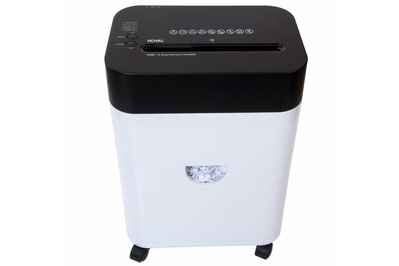
Melanie Pinola is a writer focused on home-office gear. To find the best paper shredder, she has shredded enough junk mail to fill several bathtubs.
It turns out, I’ve been recycling all wrong.
After the latest round of testing nine paper shredders, I thought I’d put the resulting 65-plus gallons of shredded paper out for recycling. But when I asked my local sanitation department if it would prefer the shreds in clear bags or cardboard boxes, the representatives said neither.
Instead, they instructed me to toss the shredded paper in with the trash.
But wait: Isn’t shredded paper still paper, and thus recyclable? Isn’t throwing away shredded paper wasteful? The answer to both questions is, well, kind of. Here’s what you need to know about the best way to dispose of shredded paper.
Check your local guidelines
The American Forest & Paper Association confirms that shredded paper is indeed recyclable. But whether shredded paper is acceptable for recycling in your town or city is another story.
So it’s best to double-check with your local sanitation or public-works department to see what you’re supposed to do with your shredded paper. Local guidelines vary—and those guidelines may or not be on the publicly accessible website or in published brochures.
For example, San Franciscans are encouraged to either place shredded paper in a stapled brown paper bag labeled “SHREDDED” or compost the shredded paper. But if you live in Rhode Island, shredded paper isn’t accepted for mixed-recycling pickup; residents can compost their shreds, throw them in the trash, or drop off shredded paper at a disposal site in Johnston, Rhode Island.
Why shredded paper isn’t always accepted for recycling

Shredded paper can be a disaster for some recycling facilities. “Shredded bits of paper are too small to be properly sorted by our facility’s machinery,” said Jared Rhodes, director of policy and programs at the Rhode Island Resource Recovery Corporation (RIRRC). They can contaminate other materials and even lead to equipment malfunctions, he added.
An article in The Providence Journal expounds on the problem, noting that when local households sent their shredded paper for recycling in paper bags, the shredding machines ripped the bags, and tiny shreds flew everywhere. When residents tried using plastic bags (or even double-bagging in plastic), the shreds still flew everywhere—and plastic wrapped around the equipment, shutting the facility down for cleaning and repairs.
As a solution, some localities outsource the recycling of shredded paper to dedicated facilities that are equipped for it, but that costs additional time and taxpayer money. You can help reduce the load by composting your shredded paper, taking documents to be shredded to a community’s free shredding event (they’ll know how to dispose of the shreds), and reducing how much you shred in the first place.
Shred only paper containing sensitive information
Paper is most suitable for recycling when it isn’t shredded, because whole pieces are easier for facilities to sort and have longer and stronger fibers ready to be made into new paper. So it’s best to avoid unnecessary shredding.
To protect your privacy, you should still shred anything with sensitive information on it, of course, such as documents with your Social Security number, financial statements, and medical records.
Our pick
This high-security shredder offers the best balance of ease of use, sheet capacity, and price.
Buying Options
However, some information on a document may be personal but not necessarily sensitive enough to need shredding, such as your name and address; your contact information may already be available on public records or services such as White Pages.
“Consider how much junk mail and spam calls you receive; that’s how known your address and phone number are,” says Max Eddy, Wirecutter’s senior staff writer covering privacy and security. Instead of shredding documents that have only your name, address, and phone number on them, you can cover that information with permanent black marker and then put the sheets into the recycling bin.
Bonus: In addition to helping the environment, reducing how much you shred can prolong the life of your paper shredder. Everybody wins.
This article was edited by Ben Keough and Erica Ogg.
Meet your guide
Melanie Pinola covers home office, remote work, and productivity as a senior staff writer at Wirecutter. She has contributed to print and online publications such as The New York Times, Consumer Reports, Lifehacker, and PCWorld, specializing in tech, work, and lifestyle/family topics. She’s thrilled when those topics intersect—and when she gets to write about them in her PJs.
Further reading
How to Recycle Your Used Electronics
by Nick Guy
Are old computers, smartphones, or monitors taking over your closet? We’ll tell you how to recycle your tech, with privacy tips so you can do so safely.
How to Get Rid of a Used Car Seat
by Christine Cyr Clisset
We talked to experts about the best ways to dispose of a used car seat, and recommend you bring your unwanted seat to Target before May 5.
Why It’s So Hard to Get Rid of Used Mattresses
by Kevin Purdy
Getting rid of a used mattress responsibly can be a challenge—one that will likely only get worse as all-foam, bed-in-a-box options become more popular.
Can You Recycle Styrofoam, Bubble Wrapping, and Other Shipping Packaging?
by Katie Okamoto
Trying to recycle the wrong packaging gunks up the works at overtaxed recycling centers. Here’s what to sort in your bins and what to throw in the trash.






